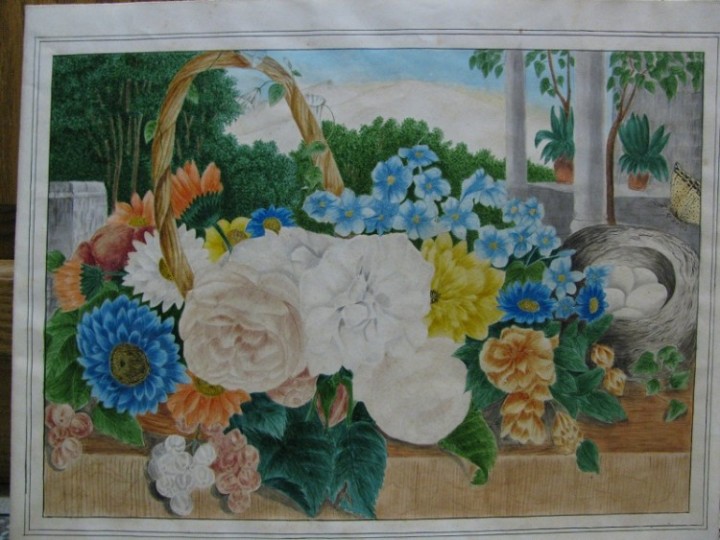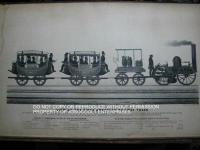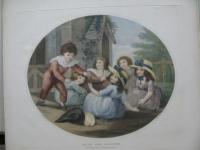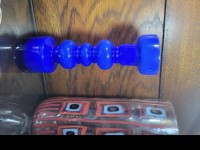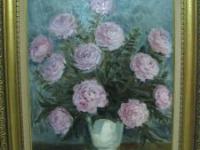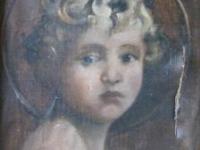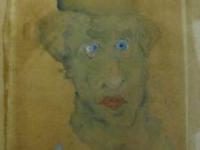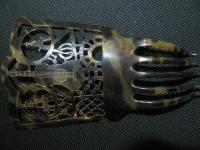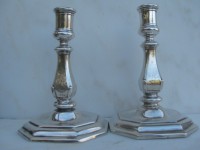PLEASE BE AWARE THAT COPYING IMAGES OF THIS ART OR USE OF ANY PART OF THE INFORMATION ABOUT THE ART WITHOUT OWNER CONSENT IS A VIOLATION OF COPYRIGHT LAWS OF THE UNITED STATES. WE WILL PURSUE ANY VIOLATIONS THEREOF, VIGOROUSLY!
Offered is an important, 19th century still life watercolor painting attributed to Frances Flora Bond Palmer, the only female lithographer of the 19th century and who was associated with the firm of Currier and Ives from 1849 to 1868. The subject, more than just a still life, depicts a floral arrangement in a basket and a birds nest with eggs in a garden against a wonderful whitecap mountain backdrop.
The painting is executed on parchment and the work measures 9 x 12-1/2 inches within the pen drawn borders. The parchment sheet measures in excess of 11 x 14 inches and is is set into an Oak frame with stretch glass and Cedar wood backing. We believe this work dates from about 1860-1865. The frame is more than likely circa 1890-1900.
CONDITION: The pigments, for the most part and despite age, are extraordinarily brilliant. There are a few very small, mild spots of discoloration in the ink drawn margin borders and a very faint spot in the painting near the right side of the basket handle at top. The edges of the parchment are folded about 1/4 inch top and bottom and about 1/2 inch on each side.
ABOUT THE ARTIST AND ATTRIBUTION: The artist was born Frances "Fanny" Flora Bond in Leicester, England July 24, 1812. She had 2 siblings, Maria and Robert. In their youth, the children were raised in a financially stable home and the sisters attended Linwood, a private school in London, run by Mary Linwood (famed Needlework artist), who taught them music, literature and the fine arts. In 1832 Frances married Edmund Seymour Palmer.
By 1841, Frances and her husband were operating a lithography business, but the venture was not profitable. About late 1843, early 1844, after the family ran into financial difficulties they left England, taking Frances' siblings Maria and Robert and settled in Brooklyn, New York. After settling, Frances began teaching girls to sing, draw and paint and was also a governess and did chaperone work. Eventually, the couple began operating their own lithography business. Frances and Edmund did piece work and advertising primarily for other firms, but Frances printed and sold flower prints and music sheet covers of her own designs. Unfortunately, their business failed again. Nathaniel Currier bought them out, but in doing so he recognized the talents that Frances possessed and hired her to his firm.
Frances worked at the N. Currier firm (Currier and Ives after 1859), from 1849 to 1868, and during those years she produced hundreds of works for the firm and was involved in every aspect of the lithograph production process. However, Currier's partner, James Merritt Ives, began limiting her freedoms due to the fact that she was unable to draw the human figure and demand for landscapes, her most notable talent, was no longer a popular marketing subject.
Edmund Palmer died in 1859, and little is known of Frances Palmer's life after she left Currier and Ives. It is thought that she engaged in private art classes at her home. Frances Flora Bond Palmer died of Tuberculosis in 1876, her sister Maria Bond by her side.
In support of attribution: In 1872, Currier and Ives produced a lithograph entitled "A Choice Basket." That print is clearly based on the subject matter depicted in this painting, but concerns only the arrangement...the landscape and other elements having been omitted. In 1862, while Palmer was still employed by the firm, Currier and Ives produced the lithograph entitled "Landscape, Fruit and Flowers," of which was one of Frances Palmer's most successful still life works. We believe the painting being offered here is the conceptual bridge between the two Currier and Ives prints mentioned herein, and it may also open the possibility that Frances was still involved in the process and/or production of some of Currier and Ives prints just as she and her husband had done for other companies while operating their own business.
Offered is an important, 19th century still life watercolor painting attributed to Frances Flora Bond Palmer, the only female lithographer of the 19th century and who was associated with the firm of Currier and Ives from 1849 to 1868. The subject, more than just a still life, depicts a floral arrangement in a basket and a birds nest with eggs in a garden against a wonderful whitecap mountain backdrop.
The painting is executed on parchment and the work measures 9 x 12-1/2 inches within the pen drawn borders. The parchment sheet measures in excess of 11 x 14 inches and is is set into an Oak frame with stretch glass and Cedar wood backing. We believe this work dates from about 1860-1865. The frame is more than likely circa 1890-1900.
CONDITION: The pigments, for the most part and despite age, are extraordinarily brilliant. There are a few very small, mild spots of discoloration in the ink drawn margin borders and a very faint spot in the painting near the right side of the basket handle at top. The edges of the parchment are folded about 1/4 inch top and bottom and about 1/2 inch on each side.
ABOUT THE ARTIST AND ATTRIBUTION: The artist was born Frances "Fanny" Flora Bond in Leicester, England July 24, 1812. She had 2 siblings, Maria and Robert. In their youth, the children were raised in a financially stable home and the sisters attended Linwood, a private school in London, run by Mary Linwood (famed Needlework artist), who taught them music, literature and the fine arts. In 1832 Frances married Edmund Seymour Palmer.
By 1841, Frances and her husband were operating a lithography business, but the venture was not profitable. About late 1843, early 1844, after the family ran into financial difficulties they left England, taking Frances' siblings Maria and Robert and settled in Brooklyn, New York. After settling, Frances began teaching girls to sing, draw and paint and was also a governess and did chaperone work. Eventually, the couple began operating their own lithography business. Frances and Edmund did piece work and advertising primarily for other firms, but Frances printed and sold flower prints and music sheet covers of her own designs. Unfortunately, their business failed again. Nathaniel Currier bought them out, but in doing so he recognized the talents that Frances possessed and hired her to his firm.
Frances worked at the N. Currier firm (Currier and Ives after 1859), from 1849 to 1868, and during those years she produced hundreds of works for the firm and was involved in every aspect of the lithograph production process. However, Currier's partner, James Merritt Ives, began limiting her freedoms due to the fact that she was unable to draw the human figure and demand for landscapes, her most notable talent, was no longer a popular marketing subject.
Edmund Palmer died in 1859, and little is known of Frances Palmer's life after she left Currier and Ives. It is thought that she engaged in private art classes at her home. Frances Flora Bond Palmer died of Tuberculosis in 1876, her sister Maria Bond by her side.
In support of attribution: In 1872, Currier and Ives produced a lithograph entitled "A Choice Basket." That print is clearly based on the subject matter depicted in this painting, but concerns only the arrangement...the landscape and other elements having been omitted. In 1862, while Palmer was still employed by the firm, Currier and Ives produced the lithograph entitled "Landscape, Fruit and Flowers," of which was one of Frances Palmer's most successful still life works. We believe the painting being offered here is the conceptual bridge between the two Currier and Ives prints mentioned herein, and it may also open the possibility that Frances was still involved in the process and/or production of some of Currier and Ives prints just as she and her husband had done for other companies while operating their own business.
- Brand Na
- Color Other
01591
Payment Methods




Shipping
USPS, FREE Shipping
Return/Exchange Policy
Returns not accepted for antique items unless the condition of the item was clearly misrepresented, seller clearly failed to properly secure item in shipping which caused damages and to which buyer must provide clear and convincing evidence, buyer received wrong item than that which was purchased.
This seller makes full and express guarantee that all items listed, purchased and received will be as they are described in the listing.
Please Login or Register first before asking a question.
